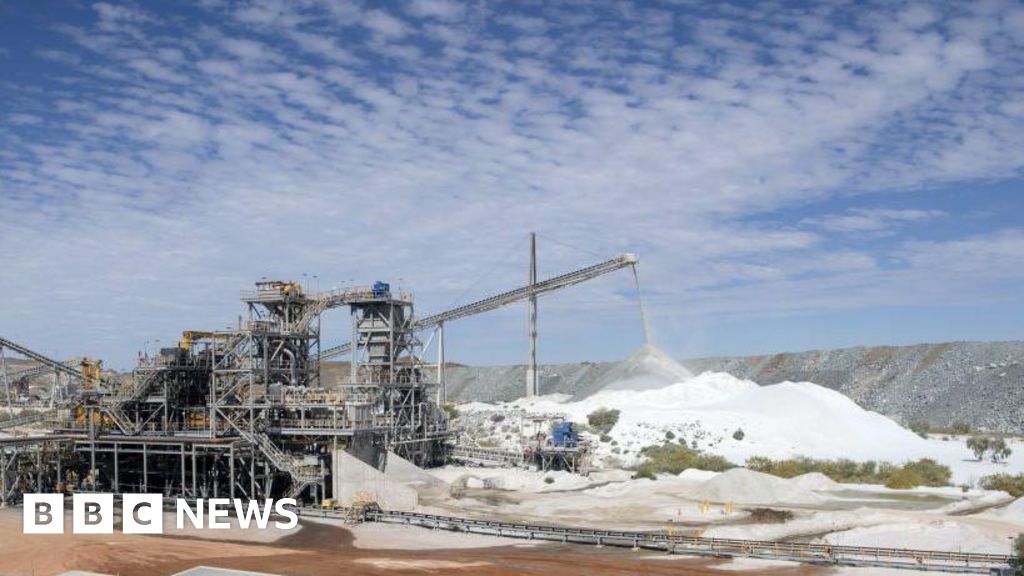Australia’s prime minister Anthony Albanese has pledged to invest A$1.2bn (£580m) in a strategic reserve for critical minerals if he wins next month’s election, as trade tensions escalate.
The announcement came after China imposed export restrictions on seven rare earth elements, essential to the production of advanced technologies – including electric vehicles, fighter jets, and robots.
China’s controls apply to all countries but were widely seen as retaliation to US President Donald Trump’s tariffs.
Albanese said Australia would prioritise minerals that are key to its security, and that of its partners, including rare earths. But could his plan challenge China’s dominance?
What are rare earth minerals and why are they important?
Rare earths are a group of 17 elements – named “rare” because they are notoriously difficult to extract and refine.
Rare earths, like samarium and terbium, are critical to the production of technologies set to shape the world in the coming decades – including electric vehicles and highly advanced weapons systems.
Albanese’s proposed reserve includes rare earths as well as other critical minerals of which Australia is a top producer – like lithium and cobalt.
Both China and Australia have rare earth reserves. But 90% of rare earth refining – which makes them usable in technology – takes place in China, giving the country significant control over supply.
And that has spooked Western governments.
Why is China restricting the export of rare earth minerals?
Beijing said its restrictions on rare earths were in response to Trump’s sweeping tariffs on Chinese imports to the US, currently at 145%.
But analysts say Washington’s inability to secure the supply of rare earths has become one of the Trump administration’s chief anxieties, especially as diplomatic tensions with Beijing have deepened.
Around 75% of US rare earth imports came from China between 2019 and 2022, according to the US Geological Survey.
Philip Kirchlechner, director of Iron Ore Research in Perth, Western Australia, told the BBC that the US and EU had “dropped the ball” on recognising the importance of the rare earths over recent decades, as China swiftly developed a monopoly over refinement.
“China has its foot on the blood vein… of US and European defence systems,” he added.
Elon Musk, CEO of Tesla, this week said that China halting exports of rare earths used in advanced magnets was affecting the company’s ability to develop humanoid robots, in an early symbol of the pain Beijing has the power to inflict on US companies.
Could Australia’s proposal change the game?
Albanese’s proposal says that minerals in the reserve will be available to both “domestic industry and international partners”, in a likely reference to allies such as the US and EU.
But Kirchlechner, while welcoming the move as “long overdue”, added that the proposal is “not going to solve the problem”.
The fundamental issue is that even if Australia stockpiles more critical minerals, the refining process of rare earths will still largely be controlled by China.
Lithium – not a rare earth, but a crucial metal in the production electric vehicle batteries and solar panels – is a good example. Australia mines 33% of the world’s lithium, but only refines and exports a tiny fraction. China, on the other hand, mines just 23% of the world’s lithium, but refines 57% of it, according to the International Energy Agency.
Australia has been investing in refining rare earths as part of its Future Made in Australia plan, aimed at leveraging the country’s critical minerals reserves to drive the green transition.
Arafura Rare Earths, headquartered in Perth, Western Australia, last year received A$840m in funding to create the country’s first combined mine and refinery for rare earths. And in November, Australia opened its first rare earths processing plant, also in Western Australia, operated by Lynas Rare Earths.
But the country is expected to depend on China for refining until at least 2026, according to the Center for Strategic and International Studies, headquartered in Washington.
How will the US and China respond?
China has been trying to seize on the volatility brought by Trump.
In a series of editorials in Australian newspapers, China’s ambassador to Canberra lambasted Washington’s approach to global trade, and called on Australia to “join hands” with Beijing – something that Albanese quickly rejected.
Australia has touted its resource industry in its talks with Trump. Some critical minerals were exempt from a 10% tariff he imposed on imports of most Australian products.
But analysts say Albanese’s proposal is mainly aimed at protecting Australia and its partners from strategic adversaries like China.
Alicia García-Herrero, chief economist for Asia-Pacific at Natixis, told the BBC that Albanese’s plan was “more sophisticated” than previous proposals, because it included the ability to sell Australia’s resources at moments of economic tension.
If China imposes export controls, she added, Australia could begin selling more of its mineral reserves to help lower prices on global markets, and loosen the control China has had on setting prices.
But she said that Australia still cannot completely replace China.
“If [Australia’s] goal is to serve the West, become more instrumental to the West – especially the US – there are weak spots China can enter – and the most important is refining.”



